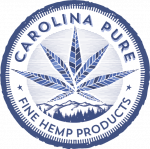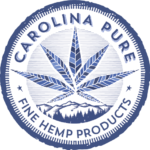The hemp and cannabis industries come with a whole host of new terminology that can get confusing even for those of us in the industry. One term we are seeing questions about is “phytocannabinoid”, so let’s explore that one in this blog post.
While many people are now familiar with the term “cannabinoid” (the active ingredient in hemp and marijuana products: CBD, THC, etc), “phytocannabinoid” is a bit less well-known. The difference between the two is pretty small and not all that complicated.
Our Endocannabinoid System
Our bodies contain an endocannabinoid system (much more detail here) that creates its own cannabinoids and it plays an important role in the release of neurotransmitters like serotonin and dopamine for critical brain functions. The same system also helps guide our immune system which includes our response to inflammation and pain. This endocannabinoid system provides many opportunities for cannabinoids to bind to receptors, which, when activated, help to maintain a healthy body.
Cannabinoids made by our bodies (and mammals in general) are referred to as endocannabinoids while cannabinoids made by plants are known as phytocannabinoids. That’s it. Phytocannabinoids are just cannabinoids that our body doesn’t make. It was thought for a while that only hemp and cannabis (I use the terms “marijuana” and “cannabis” interchangeably in this post) plants contained phytocannabinoids, which are found concentrated in the trichomes of the plants. These are the little crystals found on the surface of the leaves and the flowers (“buds”) of a hemp or marijuana plant. However, cannabinoids have been found more recently in black pepper, broccoli, carrots, and other plants.
How Many Phytocannabinoids Are there?
A lot. While the prominent cannabinoids–THC, CBD, CBG, CBN–are the ones featured in most of the current hemp products on the market, there are one hundred or more total cannabinoids and many more terpenes and flavonoids on top of that. I will discuss each of those in greater detail in future blog posts, but the short version is that these are also molecules found in hemp and marijuana plants that bind to our cells and affect the way we metabolize various cannabinoids. I have written about my experience with CBD and what a profound impact it had on my daily life when it relieved my sciatica and osteoarthritis pain almost entirely. But I’m also of the opinion that we are just getting started learning about the amazing properties of these plants as research has barely begin in the other 90+ cannabinoids about which little is known. And then there are the flavonoids and terpenes. If I sound like a zealot, it’s because I am. But with good reason!
The “Entourage Effect”
While my initial experience with CBD and the resulting pain relief that followed came from just four day’s use of CBD isolate–a form of CBD that is 99.9% pure CBD with no other parts of the hemp plant–mixed with water, I have learned since then about the “entourage effect”. An Israeli doctor, Dr. Raphael Mechoulam, came up with this phrase to describe the result of the various components of the hemp (or marijuana) plant acting together to deliver benefits to the user that are greater than the sum of the individual cannabinoids, flavonoids, and terpenes.
Dr. Mechoulam’s research showed that cannabis/hemp molecules team up to provide synergies that enhance the beneficial effects of the plant. While I often recount my initial experience with CBD isolate and think it’s a great active ingredient in a number of products for a few different reasons, there is no doubt that there are a great many additional benefits to be found in the other parts of the plant. While there is no definitive proof (yet!) to substantiate Dr. Mechoulam’s entourage effect hypothesis, count me among those who will be zero percent surprised when that proof does emerge after more research is conducted.
Cannabinoids are the compounds that bind to receptors in our body’s endocannabinoid system and play a key role in maintaining our overall health in a variety of ways. Phytocannabinoids are cannabinoids made by plants and endocannabinoids are made by our bodies (and in other mammals). The entourage effect is a term that refers to the synergistic effect of different cannabinoids, terpenes and flavonoids (both are good-for-you molecules also found in plants) all working together to accentuate the beneficial properties of hemp and cannabis plants.
Any Questions?
We tried to think of all the questions that you may have. If you can't find your answer, please email us at help@carolinapureshop.com.
There are many varieties of the cannabis plant. Both hemp and marijuana are of the species Cannabis Sativa. Hemp has much lower concentrations of THC (the psychoactive substance in marijuana) and higher concentrations of CBD while marijuana has far more THC and far less CBD. By law, hemp plants may contain no more than 0.3% of THC. For comparison, marijuana plants typically contain 5%-25% THC.
Cannabidiol ("CBD") is the most prominent of dozens of cannabinoids found in the hemp plant. CBD is extracted from stalks, stems, and flowers of hemp plants and is non-psychoactive.
Hemp-derived CBD is legal at the federal level in the United States following passage of the Hemp Farming Act of 2018. However, some areas have laws that place certain restrictions on hemp so please reference the relevant statutes in your jurisdiction.
All Carolina Pure products contain less THC than the .3% limit set by the U.S. federal government. Currently, no Carolina Pure offering contains more than .15% THC.
CBD is currently being studied for a broad range of applications. While no health claims regarding CBD can be made until the ongoing studies are concluded, many consumers are finding CBD to be a valuable addition to their daily regimen for a wide variety of reasons. Contact us and let us know what it is you like about CBD!
What People Are Saying
-
Here at Elite Chiropractic, we depend on high-quality products to provide relief to our patients. Carolina Pure CBD has embodied this through its professionalism, quality, and attentiveness. We can not recommend their products enough!
Elite Chiropractic -
Carolina Pure CBD has been a huge help for me personally. It takes effect quickly and I don't suffer side effects of harsh drugs.
Sue - Wilmington NC -
Carolina Pure works for me. It's that simple. I take it every day now.
Laura - Leland, NC



Leave a Reply